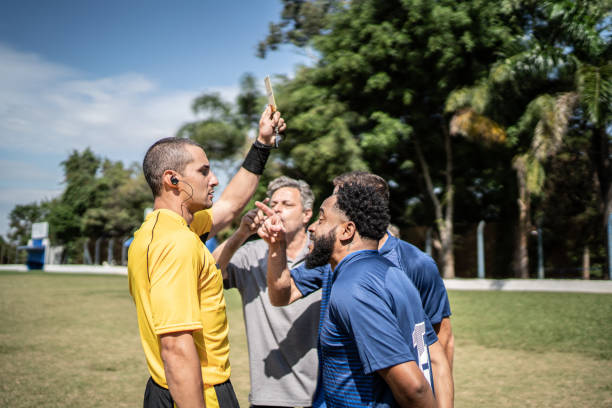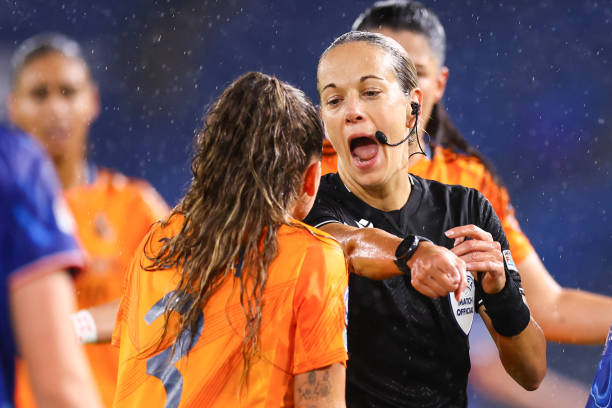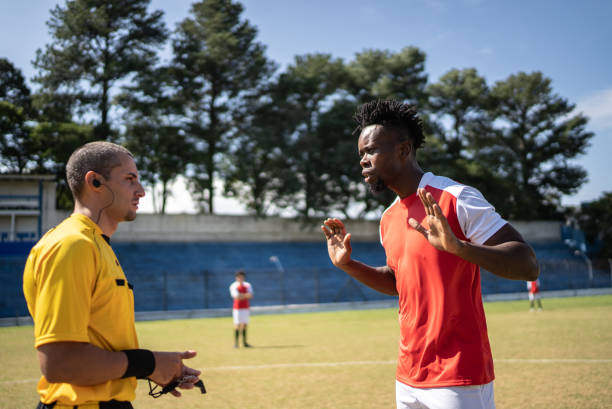Anybody who has been to, played in, or watched a soccer match on TV has seen it go down. A player doesn’t agree with a call; he throws up his arms; he shouts; and maybe he even follows the referee down the pitch, gesticulating furiously.
Sometimes they are met with a stern look, sometimes a yellow card, and occasionally… nothing.
So, is it even legal to complain to a referee in soccer? If not, then why do some players get away with it and others get cards?
It’s probably a surprise, but complaining to a referee is a big gray area in soccer.
There is no one cut-and-dried answer that applies across every possible scenario, so let’s break down the laws, the culture, and everything else one needs to know about players, referees, and that one conversation that’s always a bit. charged.
What Do the Laws of the Game Say?
First, the laws of the game, laid down by FIFA and outlined by the International Football Association Board – IFAB – does have something to say about players’ behavior vis-à-vis referees, but they certainly don’t say anything like, “No complaining is allowed.”
The nearest one gets is a series of rules and guidelines on something known as dissent and unsporting behavior.
Dissent is defined by the Laws of the Game as “showing disagreement by word or action” with the decision of the referee.
It is normally punished with a yellow card, provided it crosses certain lines.
Unsportsmanlike behavior is another, more general descriptor that surround acts like simulation, holding onto play restarts, or disrespect for the opponent, the game, or the game officials.
Thus, the law is clear: excessive complaining is a yellow card. But there is no strict prohibition against questioning of a call-or even a polite expression of frustration. The difference in manner and intensity of complaint-with how it was received by the referee.
Why This Matters
This vagueness of the rules gives referees a leeway to decide on cases concerning dissent and how far a player has crossed the line.
Also, referees are advised to retain authority and control; hence, they are not just there to give calls but they also have to make sure respect and sportsmanlike conduct are present on the field.
CHECK OUT | Do College Soccer Players Earn Money For Playing?
Why Do Players Complain?

Soccer is an emotionally charged game. Mixing personal responsibility with team reliance and spurts of high emotion, it sometimes appears that the players are just fueled on passion and adrenaline. So, when a call goes against them, it’s natural that emotions can bubble over.
Here are some reasons why players would feel like they need to complain:
- Frustration: Sometimes a player genuinely believes the call was unfair. Call it a foul that wasn’t theirs, a handball that wasn’t committed, or a penalty that was too harsh, players many times feel the need to make their case.
- Mental Games: Complaining can be a tactic at times. In “working the referee,” players hope to plant seeds of doubt so that future calls may tilt in their favor. More commonly, this is the strategy of experienced players who know how to toe the line without getting penalized.
- Work the Crowd: Sometimes players are speaking as much to the crowd as they are to the referee. A complaint can get the crowd riled, putting pressure on the referee to rethink the way they’re calling the game. Crowds can exert a huge influence on a game, particularly in those stadiums that are known for their intensity.
- Vent: Sometimes, it’s as simple as wanting to blow off steam. Soccer players aren’t robots, and after 70 minutes of running, tackling, and endless strategizing, the urge to vent at an unfavorable call can be hard to suppress.
When Does Complaining Become a Problem?
While most referees will accept that players will express their emotions from time to time, there is a line regarding what is and isn’t acceptable.
A minor complaint might be overlooked, but heavy complaining, aggression, or disrespect can have severe consequences.
Here are some of the key tipping points:
1. Physical Aggression
Physical aggression forms part of the violent behavior cases that include getting in the referee’s face, threatening gestures, or any other physical contact with him; this earns them either a yellow or a red card, almost surely.
Physical aggression crosses the thin line from complaining to intimidation, and referees are instructed to respond firmly against any behavior that may tend to escalate.
2. Insults or Offensive Language
This is guaranteed to get one booked: using offensive language or insulting the referee. To referees, verbal abuse is a red flag; they are taught to uphold not just the letter of the law but also the dignity and respect of the position.
3. Excessive Complaining or Disruption of Play
If a player is warned and continues to protest or fails to get into position and argues his case in an attempt to delay the game, then the referee has little option but to issue a yellow card for dissent.
This is because constant carping wastes time, delays play, and turns what would otherwise be an orderly game into chaos.
CHECK OUT | 7 Proven Ways to Get Recruited for College Soccer from High School
The Psychology of Complaining: Why Do Referees Tolerate It?
Most of the time, referees let some complaining slide without any immediate penalty. Why?
Referees understand that players are under an immense pressure, and their emotions run deep. Oftentimes, a referee might issue a verbal warning or just let minor complaints go to maintain the flow of the game with no unnecessary interruptions.
Moreover, blowing off some steam often eases tensions. At times, all players need to be aware is that someone has heard them.
By acknowledging their gripes-especially with something as simple as eye contact or a nod-a referee can often avoid a bigger conflict later on. As so many referees would say to you, the art of officiating involves as much psychology as rule enforcement.
Who Gets Away with Complaining More Often?

It is no secret that some players seem to get away with questioning calls, while others are carded immediately.
Why the inconsistency? A few things come into play:
1. Star Power
Superstar players may get away with a little bit more from referees. Referees know crowds are there to see these players, and as unfair as it is, it may at times affect their officiating in the game.
One such example is Lionel Messi or Cristiano Ronaldo, who perhaps would be given more space in terms of complaining before being punished.
2. Experience and Reputation
Even the benefit of doubt on veteran players who had established themselves as respectful competitors is given when a complaint is filed. On the contrary, some players known for their hostile attitudes or frequent arguing would be penalized more quickly.
3. Relationship with the Referee
Referees develop a sort of informal “relationship” with players over time, especially in professional leagues when they are working together on a regular basis.
A referee might give more latitude to a player they feel they can trust or to a player who has shown respect in the past.
It’s like any social exchange-if someone has a reputation for being reasonable, people are more likely to listen to their complaints.
CHECK OUT | Indoor Soccer Vs Outdoor Cleats/Rules (Differences)
What Coaches Say About Complaining
Most coaches will also tell you the same thing: keep it respectful and don’t let your emotions take over from your focus.
Players who spend too much time arguing with referees aren’t focusing on the game, and that can lead to missed opportunities and mistakes. Complaining can also set a bad example, especially for younger players, who might see it as acceptable behavior if it’s not managed carefully.
Competitive coaches might tolerate some protesting, hoping it gets the frustration out and allows the player to focus on the game, but they’ll usually discourage any actions that invite a booking as yellow cards for dissent can add up over the course of the season or, in some instances, turn into a red.
Famous Soccer Complaints
Over the years, we have seen players protesting-some reaching almost legendary status. Let’s take a look at a few famous examples to see how this line between complaining and dissent plays out.
- Zinedine Zidane, 2006 World Cup Final: Though technically not dissent, his headbutt on Marco Materazzi was from intense emotions and injustice. A moment that shows just how far the emotions can carry players on such a big stage.
- Diego Costa – Premier League: The Spanish international was always known for his aggressive style; both in play on the pitch and with the referees. He was always pushing to the limit, which really made him either hate or love material for referees, who many times needed to make those split-second decisions whether his complaints crossed the line or not.
- Gennaro Gattuso (Serie A): Hot-headed, the fire in his belly would often drive him through games, squarely putting him at almost constant odds with the referees. His griping and confronting were widely renowned and undeniably an integral part of his tenacious playing style.
Should Players Complain to Referees?

There are two schools of thought regarding this issue. Some players believe that working the referee is part of the game-a way of gaining an edge, getting calls to go your way.
Others firmly believe that focusing on gameplay and continuing a respectful attitude will always serve a player better in the long run.
Pros of Complaining (Politely)
- Build Rapport: Sometimes, reasonably engaging with the referee can help build rapport with them, so they may be prone to listen anytime a call is made.
- Express Frustration: Sometimes a short and controlled complaint can help a player blow off steam and refocus.
Cons of Complaining
- The Risk of Carding: Every complaint carries the possibility of a yellow card, especially if it shows a sign of disrespect or too much aggressiveness.
- Lost Focus: Wasting energy arguing takes away from the game itself, literally costing the players and their teammates much-needed focus
The Dos and Don’ts of Complaining to a Referee
Here’s a quick guide for players, fans, and coaches on what to keep in mind when it comes to handling referee complaints:
- Do Keep It Brief: A quick word or expression is usually ok. But rarely does a long-winded argument help.
- Don’t Take It Personally: Avoid using any language that could possibly be interpreted as an insult or slur.
- Do Know When to Quit: If the referee has already warned you once, it is better to just let it go.
- Don’t Let Complaining Overshadow the Game: Remember, it’s a distraction. Staying focused on the game will almost always be more productive.
Wrapping it up
So, is complaining to a referee legal in soccer? The short answer is: yes, as long as it’s respectful and within reasonable limits.
Soccer is a game of passion and split-second decisions, so it’s only natural that players will sometimes feel aggrieved by a call. But while a quick complaint might be tolerated, players risk a yellow card and potential reputation damage if they take it too far.
As with many things in soccer, it’s about balance and respect. Referees, like players, are human, and understanding that can make all the difference on the pitch.


